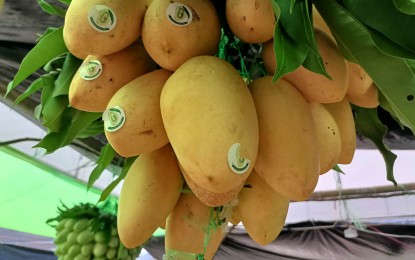
SWEETEST. Mangoes from Guimaras province are the sweetest, with sweetness ranging from 16-degree Brix and higher. The provincial government was conferred the certificate of geographical indication registration by the Intellectual Property Office of the Philippines (IPOPHL) during the National Geographical Indications Forum held in Makati City on May 22-23. (PNA photo by PGLena)
MANILA – Philippine products are expected to level up their profitability by registering as geographical indications (GI) as this will establish and grow the Philippine brand around the world with a reputation for high-quality, according to Senator Sonny Angara.
“Kung ang farmgate price lang ang pag-uusapan natin, nakita natin ang pagpalo ng presyo ng Guimaras mangoes. Mula sa PHP25 kada kilo noong 2017, ang halaga nito ngayon ay nasa PHP80 hanggang PHP150 kada kilo na (If we talk about the farmgate price, we can see the increase in the price of Guimaras mangoes. From PHP25 per kilo in 2017, its price now ranges from PHP80 to PHP150 per kilo already)," Angara said on Tuesday citing Guimaras mangoes as an example which is the only registered GI in the country.
The Intellectual Property Office of the Philippines (IPOPHIL) came out with the rules and regulations for the registration of GIs in the country last October 2022 and this paved the way for the grant of the country’s first GI to the world-class fruit from Guimaras province located in Western Visayas region.
"Ito ay isa lamang sa mga benepisyo ng GI na ating isinusulong upang mas marami pang mga magsasaka, negosyante at bayan na makaranas ng pag-asenso (This is just one of the benefits of GI that we are pushing to let more farmers, businessmen, and towns experience progress),” Angara said.
Senate Bill 2387, which was sponsored by Angara as one of the authors, already reached the Senate plenary on Monday.
It seeks the establishment of a scheme for the protection, development and encouragement of GIs which are a form of intellectual property and refer to any outward sign or mark that identifies a good or product as originating from a specific territory or locality, and hence, as having a specific quality, reputation or characteristic.
Through such scheme, the State shall endeavor to help producers secure fairer returns for the quality and uniqueness of their products; protect the intellectual property embedded within the GI; provide clear information to consumers on the value-adding attributes of the covered product; manage the system for registering GIs; and prevent any unfair or anti-competitive practices that may devalue the products or work covered by the GI.
“Think about how products that say ‘Made in Japan’ or ‘Made in Germany’ are immediately regarded or thought of as having superior quality and hence are able to command higher prices in the market. Our bill basically makes sure that when a product conveys that it is made or grown from a specific place, it really is made or grown from that specific place,” Angara explained.
While the current Intellectual Property Code already provides for protections of GIs, he noted that there are gaps that exist. One common issue that the bill seeks to address is on GI infringement and unfair competition.
Under the bill, any form of violation of the protected GI is treated as an offense against the economic interest of the State.
IPOPHIL says there are 29 products with a huge potential of being granted GIs. These are: the T’Nalak of Lake Sebu; Davao Pummelo; Bikol Pili; Batangas Barako; Bonoan Bangus; Aklan Piña Cloth; Burdang Lumban; Cebu Dried Mangoes; Heirloom Rice of the Cordilleras; Kalinga Coffee; Bagtason Loom of Antique; Yakan Cloth (Zamboanga and Basilan); Sabutan Weave of Aurora; Camiguin Lanzones; Davao Cacao; Bohol Ube Kinampay; Asin Tibuok of Alburquerque, Bohol; Basey Banig of Samar; Buhi Weave of Camarines Sur; Masbate Beef and Milagros Carmelado of Masbate; Laguna Coffee; Liliw Footwear; Paete Wood Carvings; Benguet Strawberries; Benguet Cacao; Tuburan Coffee; Calauan Pineapple; and Lambanog (Quezon, Batangas and Laguna).
Meanwhile, Senate President Pro Tempore Loren Legarda on Tuesday said more measure are needed in promoting geographical indications (GI) in the Philippines to safeguard intellectual property mechanisms.
Legarda, co-authored and co-sponsored of Senate Bill No. 2387, or the Protected Geographical Indications Act, said locals will be motivated with pride and collective self-worth that their very own are recognized, adding they will continue to strive for perfection and even variation, confident that they have government recognition and support.
"Let us remind ourselves that there is only so much that legal recognition can do. Loving our own, patronizing our own, and bearing our own with our head held high, whether registered or not, are themselves protections and should be nurtured," she said. (With a report from Leonel Abasola/PNA)
